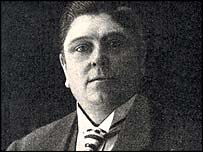In researching this post, though, I had no idea that Mills was actually, to cop Ron Burgundy, kind of a big deal. (At least in the world of "poets who are Christians," admittedly a pretty narrow definition of "big deal.")
d. 1924
He plays a pair of castanets
To keep his hands from shaking, waiting
For the cue to join a choir
Of a cappella boys whose voices
May not last another year.
An audience fills the concert hall and he
Can hear the hard-heel sounds of feet in the aisles.
Backstage, among the pulleys and ropes,
He knows that he will soon perform in posture
Learned a few days after surgery,
When he remembers standing on the terrace,
Looking out across the moonlit city
After bathing, feeling how the night
Moved over him like wind on a broken tooth.
On cue he walks to center stage and feels
The atmosphere of all interior space
Drawn up together by the common gasp
Of many people waiting for the voice
That rose in boyhood to the breaking point
And froze before falsetto called him false.
And then his heart is all that he can hear.
That old accustomed sense of rushing air
Comes over him as he begins to sing.
This time it's his arrangement from The Tempest,
Something of the yellow sand and waves
That whilst around an island caught in a storm.
But all that he can think about tonight
Is when he visited America
Where in New Orleans on the singing tour
He saw a clackety clip of silent film
And heard the bijou organ player stop
To watch a woman on a slab of ice
As she was carried down a stream unconscious.
Moviegoers waited for the hero
Tilting out across the jagged slabs
In time to save her from a waterfall.
And now he's trying to identify
With either hero, heroine, or ice,
But none of them are right.
He only knows
That he was singled out and set apart,
An orphan of himself who testifies
Of sea change into something rich and strange
Like any artist, or the art itself
That says, "Remember me. Remember me."
I love the incongruous details like the nickelodeon theater, contrasting the old world of Shakespeare and the castrati with the new world of penny arcade entertainment.
I don't know for sure if the poem is actually about the man called "The Last Castrato," Alessandro Moreschi. (Especially since Moreschi died in 1922, not 1924.) But the Wikipedia entry on Moreschi is a pretty good read, too.
You should also hear a clip of Moreschi, the only castrato known to have made recordings.
The Last Castrato
Wilmer Mills
d. 1924
He plays a pair of castanets
To keep his hands from shaking, waiting
For the cue to join a choir
Of a cappella boys whose voices
May not last another year.
An audience fills the concert hall and he
Can hear the hard-heel sounds of feet in the aisles.
Backstage, among the pulleys and ropes,
He knows that he will soon perform in posture
Learned a few days after surgery,
When he remembers standing on the terrace,
Looking out across the moonlit city
After bathing, feeling how the night
Moved over him like wind on a broken tooth.
On cue he walks to center stage and feels
The atmosphere of all interior space
Drawn up together by the common gasp
Of many people waiting for the voice
That rose in boyhood to the breaking point
And froze before falsetto called him false.
And then his heart is all that he can hear.
That old accustomed sense of rushing air
Comes over him as he begins to sing.
This time it's his arrangement from The Tempest,
Something of the yellow sand and waves
That whilst around an island caught in a storm.
But all that he can think about tonight
Is when he visited America
Where in New Orleans on the singing tour
He saw a clackety clip of silent film
And heard the bijou organ player stop
To watch a woman on a slab of ice
As she was carried down a stream unconscious.
Moviegoers waited for the hero
Tilting out across the jagged slabs
In time to save her from a waterfall.
And now he's trying to identify
With either hero, heroine, or ice,
But none of them are right.
He only knows
That he was singled out and set apart,
An orphan of himself who testifies
Of sea change into something rich and strange
Like any artist, or the art itself
That says, "Remember me. Remember me."
I love the incongruous details like the nickelodeon theater, contrasting the old world of Shakespeare and the castrati with the new world of penny arcade entertainment.
I don't know for sure if the poem is actually about the man called "The Last Castrato," Alessandro Moreschi. (Especially since Moreschi died in 1922, not 1924.) But the Wikipedia entry on Moreschi is a pretty good read, too.
You should also hear a clip of Moreschi, the only castrato known to have made recordings.

No comments:
Post a Comment